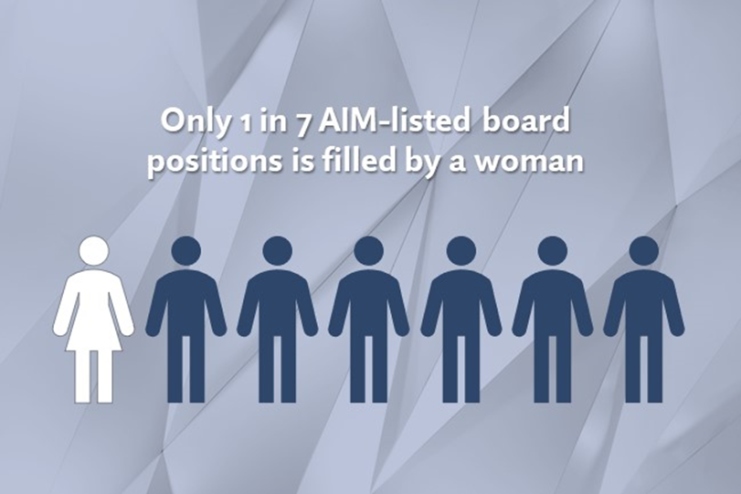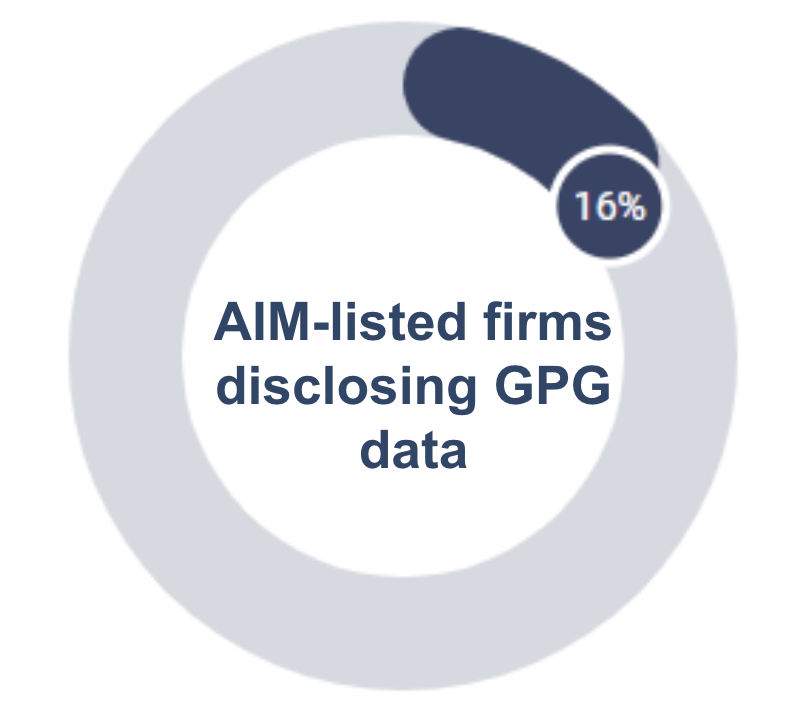Gender diversity; an opportunity for AIM-listed firms

To celebrate International Women’s Day on Wednesday March 8th 2023, Addidat Limited and Indigo: Independent Governance have collaborated to provide some insights into women on boards and Gender Pay Gap reporting across AIM-listed companies.
Women on Boards
According to Addidat’s proprietary dataset, the mean average for women on boards across all AIM companies is 14%, meaning only 1 in 7 AIM-listed board positions is currently filled by a woman. Perhaps an even more stark number is that 42% of all AIM listed companies (351 of 830) did not have any women on their boards in 2022.
By contrast, the proportion of women on board roles across the FTSE 350 has risen above 40% according to the recently published FTSE Women Leaders Review; whereas only 7% of AIM-listed companies meet the same criteria.
Within AIM, the industry sectors with the highest percentage of women on boards are Consumer Staples and Consumer Discretionary, both with 19%. Interestingly, these industries also report the smallest Gender Pay Gap (GPG).
On the other hand, the smallest percentage of women on boards are within the Energy and Basic Materials industries, with only 8% of board positions being held by women. These industries also report the largest GPG.

Gender Pay Gap Reporting

In the UK, employers with 250 or more employees are required to report on their GPG annually, including the mean and median gender pay gaps, the proportion of men and women in different pay bands, and the proportion of men and women receiving bonuses.
Companies are encouraged to provide a narrative explaining the reasons for their GPG and any actions they are taking to address it.
As AIM-listed companies tend to be smaller, not all of them fall within the mandatory GPG reporting requirements. Addidat’s propriety dataset shows that, in 2022, only 16% of AIM companies disclosed any GPG data (130 out of 830 companies are reporting).
Reflecting their larger workforces, the industry sectors within AIM with the highest GPG reporting volumes are Consumer Staples, with 38% of such companies reporting, and Consumer Discretionary, with 36% reporting. In contrast, the industries with the lowest GPG reporting volumes are Basic Materials with 2%, Energy with 3%, and Real Estate with 4%.
Gender Pay Gap Metrics
Whilst the mix of company sizes within the AIM market means data is not available across the whole cohort, the information shows that the mean average of the “Difference in Hourly Mean Pay %” across all AIM companies who report their GPG is 20.0%.
However, 8 out of the 130 companies reporting Gender Pay Gap provided a negative result, meaning that on average, women’s gross hourly earnings within those companies are higher than those of men.

Benefits of Women on Boards
Indigo supports strong corporate governance in many boards of directors, including those of AIM companies, and, in our experience, the benefits of a diverse board composition are very clear. Debate, decision-making, and boardroom dynamics are significantly enriched by bringing different experiences, backgrounds, and views into the boardroom. Gender is not the only diversity factor that boards should be considering, but it is certainly an important one.
AIM companies are not subject to the formal gender diversity targets that apply to the boards and senior leadership teams of the FTSE350, but the QCA Corporate Governance Code which many AIM companies follow, requires the board to ‘understand and challenge its own diversity, including gender balance’. So, gender diversity should certainly be something that all boards and their nomination committees keep under active review, particularly when looking at succession planning, pipeline development and recruitment.
Board diversity is not a ‘silver bullet’ to secure board effectiveness, and it is still critical that the right mix of skills, knowledge and experience are present around the board table. But it makes no sense to select directors from an artificially restricted male-dominated pool of candidates. The low average number of women on AIM boards indicates that many companies are still missing out on the significant benefits of greater diversity and the value that talented women could bring to their governance and the long-term success of their businesses.
Conclusion
Both Addidat and Indigo believe a diverse workforce and leadership has significant and wide-ranging benefits; the business case is easy.
Diversity of thought in an organisation can help to widen sales networks, enhance understanding of the customer base, improve innovation, reduce attrition as well as identify and navigate risks and opportunities better in the boardroom. There are also new Equality regulations, from both the FCA and the EU, which are yet to impact AIM-listed firms but provide an insight of what may come.
It’s clear there is a lot more work to be done to achieve gender equality in AIM market participants and it will certainly be more difficult to achieve in some sectors than others.
There is a significant wealth of talented, skilled and board-ready women for firms to employ. Although moving from the glass ceiling to the glass cliff, where women are set up to fail, is a risk, companies can mitigate this by ensuring they are focused on employing the best candidate for the job.
There are several ways in which companies can improve their diversity including via succession planning, recruitment and pipeline development. For example, employing sourcing partners who specialise in diverse board recruitment to widen the pool of candidates, and challenging recruitment selection criteria to both remove any biases and identify clear minimum success criteria. Boards should also be courageous through setting and disclosing diversity targets, and taking accountability for tracking, meeting, and exceeding them.
Achieving gender equality is not easy to get right and will take thought and time to implement successfully but as has been seen in the FTSE 350, real progress can be made from a low base in a relatively short period of time. If your firm lacks diversity, the business case is compelling to start acting today to improve diversity and performance.